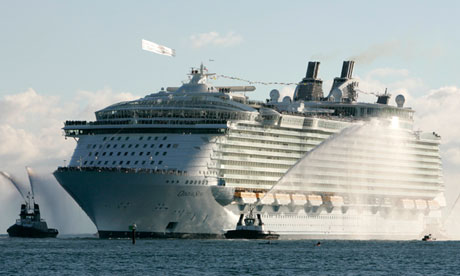
The cruise from hell has become a familiar headline. The past year has seen a steady flow of accidents and disasters from on-board fires to mass outbreaks of norovirus and power failures leading to "toxic" conditions, all of which came after the Costa Concordia tragedy, in which 32 people died.
And yet if this litany of negative reports has been a "public relations disaster", nobody seems to have told the public.
In fact, the cruise market has never been healthier, and it is British holidaymakers who are at the forefront of an extraordinary rise in bookings. More than 1.7 million British holidaymakers took a cruise in 2012, making it the biggest cruise market in Europe, according to a report launched today by the industry body Cruise Lines International Association (CLIA). European passenger numbers totalled 6.1 million and the global figure was 20.9 million.
So what is it that we love so much about holidays at sea?
"It's the variety," says Jo Rzymowska, chair of CLIA (UK & Ireland) and general manager of Royal Caribbean Cruises, owners of the world's largest cruise ship, the Oasis of the Seas (capacity: 6,000 passengers).
The days when quoits was the height of daytime entertainment are long gone. On board zip wires, climbing walls, water slides, a croquet lawn, and a full-sized carousel are among the mind-boggling variety of activities that have helped attract a younger market, in particular families, to cruising.
Niche cruises aimed at special interest groups are also fuelling growth. A few years ago, nothing would have induced a bunch of music-loving youngsters to voluntarily board a cruise ship, but now that America's Coachella festival has taken to the seas, rock and luxury cruising is no longer seem as a laughable combination. Even more incongruous is the Barge from Hell, which saw 1,200 tattooed metal fans partying on board a Caribbean cruise last December.
At the other end of the spectrum are specialist expeditions and small boats cruising remote waters of the Arctic, Amazon or Galapagos with experts on board to give guided tours and evening talks.
Rzymowska says the perceived value for money has also been key. "Very often food and entertainment are included."
She says accessibility is another factor driving the rise among British holidaymakers: "We live on an island where the weather's not great – and we can't wait to get off it."
And it's never been easier to escape. Southampton is the biggest cruise port in Europe but there are another 18 departure points in the UK.
This is no passing trend. Cruising is set to grow and grow. According to Rzymowska, there are 20 new cruise ships on order worldwide over the next three years, worth a total of €10.5bn. Most of them are larger ships, guaranteed to have an even wackier selection of on-board attractions.
Setting sail for the first time this summer, the MSC Divina features a "real stone piazza" and a Broadway-sized theatre, while Royal Caribbean's Quantum of the Seas, which is due to make its maiden voyage at the end of 2014, will have several industry firsts, including bumper cars, a sky-diving simulator, virtual balconies so that all passengers – even those in inside cabins – have sea 'views,' and a London Eye-style pod that reaches 27 feet out into the ocean. Quite how the modern-day cruisers have time to actually get off the ship and see the world is anyone's guess.

